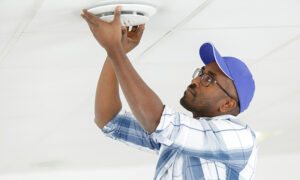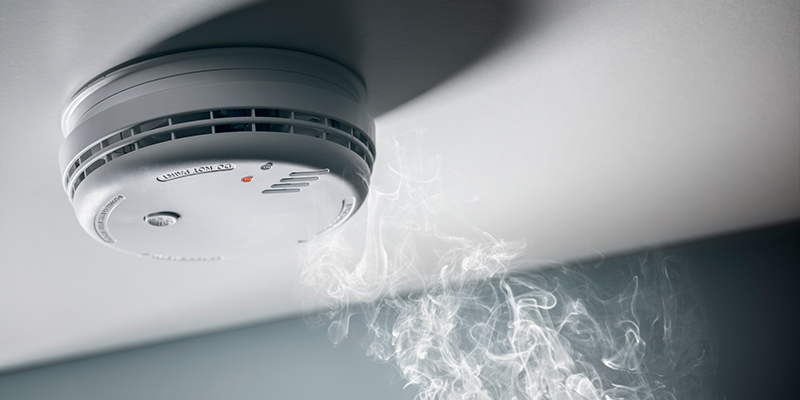Landlords aren’t always aware of their responsibilities when installing tenant smoke alarms. But it’s certainly something they must keep in mind to foster a safe environment. They should also be aware of their rights in case of tenant misuse or mishandling.
Are Tenant Smoke Alarms Required in Rental Properties?
Almost every state and local law requires adding tenant smoke alarms in rental property. For instance, the city of Springfield, Missouri, abides by the Fire Code, which states that owners and landlords of rental properties must provide smoke alarms. Likewise, the state of Oregon requires all homes being sold or rented to have functioning smoke alarms. Some laws and codes also have specific provisions regarding their placement.
Furthermore, many states impose additional carbon monoxide rules for landlords and new buildings. In 2011, several states embraced new building codes that mandate carbon monoxide detectors in family homes with one or two stories. Years later, over 48 states have passed laws that mandate carbon monoxide detectors in homes.
However, some states do not have smoke alarm requirements for landlords. Some laws may be silent, allowing landlords and property owners more freedom. Nonetheless, installing functioning smoke detectors is always a good idea. That’s because, even without legislation, landlords are responsible for keeping their rental properties safe and habitable. Their properties should have adequate fire protection — which includes smoke alarms.
What Are the Landlord’s Responsibilities?
What are the landlord’s responsibilities regarding providing smoke detectors in rentals? Here are some of the things property owners and landlords should keep in mind.
 1. Installation
1. Installation
Generally, smoke alarm rental laws place the responsibility of installation on the landlord’s shoulders. Property owners and landlords should take it upon themselves to install tenant smoke detectors in their rental property.
They must also verify whether the smoke alarm is in proper working condition. Moreover, they are responsible for installing the smoke detectors in the right placements according to the manufacturer’s instructions, state law, and relevant building codes.
2. Providing the First Smoke Alarm Batteries in Rentals
At the start of each tenancy, the landlord must ensure each smoke detector has working batteries. Afterward, the responsibility of battery replacements often falls on the tenant. However, tenants may purchase the batteries and ask the landlord to replace them if the tenant is incapable or uncomfortable doing so.
3. Informing Tenants of Smoke Detector Placements
Tenants have the right to know where the smoke alarms are. After all, they are responsible for battery replacements and conducting regular inspections. They cannot do so without knowing where each smoke alarm is located. Hence, landlords should carefully inform their tenants of smoke detector placements.
4. Instructing Tenants on Proper Testing Procedures
Tenants are generally responsible for testing smoke detectors and informing the landlord in writing of any malfunctions. However, they should know the proper testing procedure to be able to do this. If a tenant damages the smoke detector because of an incorrect testing procedure, they may not be held responsible if the landlord did not properly instruct them.
5. Informing the Tenant How They Can Report Problems
While it is the tenant’s responsibility to inform their landlords of any problems, landlords should make it a point to inform them how these problems can be reported. Often, tenants need to provide reports or complaints in writing. The landlord’s line of communication must be open to the tenants through mail, email, or other means.
 6. Repairing and Replacing Malfunctioning Smoke Alarms
6. Repairing and Replacing Malfunctioning Smoke Alarms
Landlords may receive feedback from tenants stating that the smoke alarms are not working. In these cases, it is the landlord’s responsibility to repair or replace any malfunctioning smoke alarms. Doing so will keep them from being liable should any accidents occur. It also keeps the rental property compliant with smoke alarm laws or building codes.
7. Upgrading Old Smoke Detectors
Smoke detectors have a limited lifespan, just like any other electronic device. Who is responsible for replacing smoke alarms in rented properties when these devices reach the end of their useful life? Naturally, the obligation falls on the landlord. Smoke detectors usually last about 10 years but may have shorter or longer lifespans, depending on the manufacturer.
What Are the Landlord’s Rights?
Landlords shouldn’t just be aware of their responsibilities regarding tenant smoke alarms. That’s because they also have certain rights they must be aware of. Awareness of these can help landlords and property owners avoid liability and protect themselves from legal repercussions.
1. Add an Addendum to the Lease Agreement
Landlords can add a tenant smoke detector agreement in the lease contract stating that functioning smoke alarms were installed correctly before the tenancy. This allows landlords to protect themselves from claims that they did not fulfill their responsibility of installing proper smoke detectors. It helps them avoid liability should anything happen.
2. Avoid Liability When There’s a Lack of Notification
Depending on local and state laws, the landlord is not required to test the rental property’s smoke detectors regularly. It is often the tenant’s responsibility. Hence, landlords can avoid liability if a fire occurs and they are not notified of a smoke alarm’s malfunctions beforehand.
3. Avoid Liability for Lack of Maintenance and Battery Replacements
Many state and local laws place maintenance responsibilities on the tenants. For example, Washington law requires explicitly that tenants maintain smoke detectors and replace their batteries. In such cases, tenants cannot hold the landlord liable for neglecting to replace batteries or conduct maintenance activities.
4. Deal With Tenants Who Tamper With the Alarms
Tampering with smoke alarms is more than just a lease violation. In most states, it is illegal for tenants to remove or disconnect any smoke alarms installed. Landlords can give the tenant a deadline to re-attach the smoke alarm if this happens. Otherwise, landlords can force the tenant to vacate the rental property.
Some landlords may even be able to evict tenants immediately if they have a monthly lease. In some cases, landlords may also be able to impose fines on the tenant. However, landlords and property owners should always consult a rental lawyer before they attempt this as state laws may vary.
Know Your Rights and Responsibilities
Landlords must always be aware of their responsibilities when it comes to installing tenant smoke alarms. They must also stay updated on state and local law changes to remain compliant. Moreover, they need to review any new building codes to avoid liability.
Are you having trouble managing your rental property and staying updated on relevant legislation? Hiring a property management company may help. Browse through our online directory to find one today!
RELATED ARTICLES:




 Company
Company